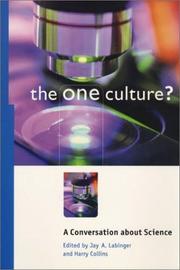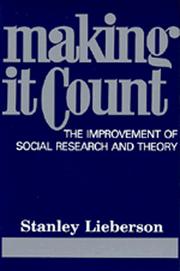| Listing 1 - 5 of 5 |
Sort by
|
Book
ISBN: 1606498339 Year: 2013 Publisher: New York, New York (222 East 46th Street, New York, NY 10017) : Business Expert Press,
Abstract | Keywords | Export | Availability | Bookmark
 Loading...
Loading...Choose an application
- Reference Manager
- EndNote
- RefWorks (Direct export to RefWorks)
Conducting good research is critical to any student today. Writing good research papers is equally important--yet many students have not been given the proper tools to convey cogently the results of their research. This is intended to address and redress this need. This book is literally a step-by-step approach to the writing of an undergraduate or graduate level research paper in the field of economics.
Economics --- Report writing. --- Research. --- drafting --- presentation --- formatting --- data collection --- research hypotheses --- literature reviews --- research topics --- research questions --- regression --- regression models --- inference --- equation editing --- table design
Book
ISBN: 1503611396 150362823X 1503628248 9781503628243 9781503611399 9781503628236 Year: 2021 Publisher: Stanford, California
Abstract | Keywords | Export | Availability | Bookmark
 Loading...
Loading...Choose an application
- Reference Manager
- EndNote
- RefWorks (Direct export to RefWorks)
The inclusive, flexible alternative to rigid traditional advice.
Social sciences --- Qualitative research. --- Research --- Methodology. --- archival/historical methods. --- causal inference. --- content analysis. --- data analysis. --- data collection. --- ethnographic and interview methods. --- qualitative methods. --- research design. --- research questions. --- social science research. --- Qualitative analysis (Research) --- Qualitative methods (Research)

ISBN: 1282738445 9786612738449 0226467244 9780226467245 9780226467221 0226467228 0226467236 0226467228 9780226467221 Year: 2001 Publisher: Chicago, Ill. University of Chicago Press
Abstract | Keywords | Export | Availability | Bookmark
 Loading...
Loading...Choose an application
- Reference Manager
- EndNote
- RefWorks (Direct export to RefWorks)
So far the "Science Wars" have generated far more heat than light. Combatants from one or the other of what C. P. Snow famously called "the two cultures" (science versus the arts and humanities) have launched bitter attacks but have seldom engaged in constructive dialogue about the central issues. In The One Culture?, Jay A. Labinger and Harry Collins have gathered together some of the world's foremost scientists and sociologists of science to exchange opinions and ideas rather than insults. The contributors find surprising areas of broad agreement in a genuine conversation about science, its legitimacy and authority as a means of understanding the world, and whether science studies undermines the practice and findings of science and scientists. The One Culture? is organized into three parts. The first consists of position papers written by scientists and sociologists of science, which were distributed to all the participants. The second presents commentaries on these papers, drawing out and discussing their central themes and arguments. In the third section, participants respond to these critiques, offering defenses, clarifications, and modifications of their positions. Who can legitimately speak about science? What is the proper role of scientific knowledge? How should scientists interact with the rest of society in decision making? Because science occupies such a central position in the world today, such questions are vitally important. Although there are no simple solutions, The One Culture? does show the reader exactly what is at stake in the Science Wars, and provides a valuable framework for how to go about seeking the answers we so urgently need. Contributors include: Constance K. Barsky, Jean Bricmont, Harry Collins, Peter Dear, Jane Gregory, Jay A. Labinger, Michael Lynch, N. David Mermin, Steve Miller, Trevor Pinch, Peter R. Saulson, Steven Shapin, Alan Sokal, Steven Weinberg, Kenneth G. Wilson
Science --- Science and state. --- Normal science --- Philosophy of science --- Science policy --- State and science --- State, The --- Science and society --- Sociology of science --- Social aspects. --- Philosophy. --- Government policy --- Sociology of knowledge --- science, legitimacy, scientific knowledge, polanyi, turing, wittgenstein, sociology, public opinion, policy, government, popular culture, physics, history, epistemography, research questions, social construction, antiscience, relativism, methodology, contingency, overdetermination, experience, authority, historiography, philosophy, academia, nonfiction.
Book
ISBN: 3031190785 3031190777 Year: 2023 Publisher: Cham : Springer International Publishing AG,
Abstract | Keywords | Export | Availability | Bookmark
 Loading...
Loading...Choose an application
- Reference Manager
- EndNote
- RefWorks (Direct export to RefWorks)
This book is about scientific inquiry. Designed for early and mid-career researchers, it is a practical manual for conducting and communicating high-quality research in (mathematics) education. Based on the authors’ extensive experience as researchers, as mentors, and as members of the editorial team for the Journal for Research in Mathematics Education (JRME), this book directly speaks to researchers and their communities about each phase of the process for conceptualizing, conducting, and communicating high-quality research in (mathematics) education. In the late 2010s, both JRME and Educational Studies in Mathematics celebrated 50 years of publishing high-quality research in mathematics education. Many advances in the field have occurred since the establishment of these journals, and these anniversaries marked a milestone in research in mathematics education. Indeed, fifty years represents a small step for human history but a giant leap for mathematics education. The educational research community in general (and the mathematics education community in particular) has strongly advocated for original research, placing great emphasis on building knowledge and capacity in the field. Because it is an interdisciplinary field, mathematics education has integrated means and methods for scientific inquiry from multiple disciplines. Now that the field is gaining maturity, it is a good time to take a step back and systematically consider how mathematics education researchers can engage in significant, impactful scientific inquiry.
Education --- Study & learning skills: general --- Teaching of a specific subject --- Research questions --- Hypotheses --- Theoretical framework --- Scientific inquiry --- Robust methods --- Interpretation of findings --- Pilot study --- Unexpected findings --- Continuous improvement --- Communicating research --- Learning opportunities --- Impact on practice --- Mathematics --- Research --- Methodology. --- Study and teaching. --- Math --- Science --- Ensenyament de la matemàtica --- Matemàtica --- Investigació

ISBN: 1282355317 9786612355318 0520908422 9780520908420 0520053508 0520060377 9780520060371 9781282355316 661235531X Year: 1987 Publisher: Berkeley, Calif. University of California Press
Abstract | Keywords | Export | Availability | Bookmark
 Loading...
Loading...Choose an application
- Reference Manager
- EndNote
- RefWorks (Direct export to RefWorks)
This title reexamines and reconsiders the model of empirical research underlying most empirical work. The goal is neither a whitewash nor capital punishment, but rather it is to reform and mold empirical research into an activity that contributes as much as possible to a rigorous understanding of society. Without worrying about defining science or even determining the essence of the scientific enterprise, the goal is one that pools together logical thinking and empirically determined information. One of the fundamental issues to be addressed in this volume: Are there questions currently studied that are basically unanswerable even if the investigator had ideal nonexperimental data? If so, what are the alternative questions that can be dealt with successfully by empirical social research, and how should they be approached? In the chapters ahead, it will be important to keep in mind this doctrine of the undoable. Of course, one cannot simply mutter ";undoable"; when a difficult obstacle is encountered, turn off the computer, and look in the want ads for a new job-or at least a new task. Instead, it means considering if there is some inherent logical reason or sociological force that makes certain empirical questions unanswerable. There are four types of undoable questions to consider: those that are inherently impossible; those that are premature; those that are overly complicated; and those that empirical and theoretical knowledge have nullified.
Sociology --- Social sciences --- Research --- Methodology. --- 303 --- #SBIB:303H10 --- 303 Methoden bij sociaalwetenschappelijk onderzoek --- Methoden bij sociaalwetenschappelijk onderzoek --- Methoden en technieken: algemene handboeken en reeksen --- Methods in social research (general) --- boyles law. --- causality. --- causation. --- conducting research. --- data collection. --- empiricism. --- evaluating data. --- logic. --- nonexperimental data. --- nonfiction. --- political science. --- quasi experiment. --- research assumptions. --- research methods. --- research questions. --- research. --- sampling problems. --- science. --- scientific enterprise. --- scientific method. --- scientific theory. --- selectivity. --- social research. --- social science. --- sociological methodology. --- sociology. --- variables.
| Listing 1 - 5 of 5 |
Sort by
|

 Search
Search Feedback
Feedback About UniCat
About UniCat  Help
Help News
News